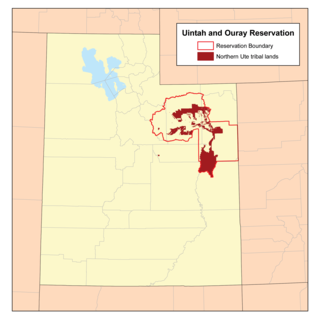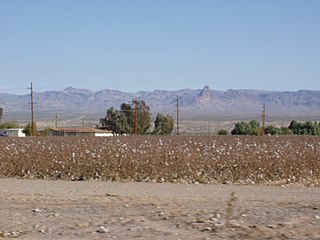Worcester v. Georgia, 31 U.S. 515 (1832), was a landmark case in which the United States Supreme Court vacated the conviction of Samuel Worcester and held that the Georgia criminal statute that prohibited non-Native Americans from being present on Native American lands without a license from the state was unconstitutional. The opinion is most famous for its dicta, which laid out the relationship between tribes and the state and federal governments. It is considered to have built the foundations of the doctrine of tribal sovereignty in the United States.

Tribal sovereignty in the United States is the concept of the inherent authority of Indigenous tribes to govern themselves within the borders of the United States.

The Indian Gaming Regulatory Act is a 1988 United States federal law that establishes the jurisdictional framework that governs Indian gaming. There was no federal gaming structure before this act. The stated purposes of the act include providing a legislative basis for the operation/regulation of Indian gaming, protecting gaming as a means of generating revenue for the tribes, encouraging economic development of these tribes, and protecting the enterprises from negative influences. The law established the National Indian Gaming Commission and gave it a regulatory mandate. The law also delegated new authority to the U.S. Department of the Interior and created new federal offenses, giving the U.S. Department of Justice authority to prosecute them.

Neil McGill Gorsuch is an American jurist who serves as an associate justice of the Supreme Court of the United States. He was nominated by President Donald Trump on January 31, 2017, and has served since April 10, 2017.

The Uintah and Ouray Indian Reservation is located in northeastern Utah, United States. It is the homeland of the Ute Indian Tribe, and is the largest of three Indian reservations inhabited by members of the Ute Tribe of Native Americans.
Duro v. Reina, 495 U.S. 676 (1990), was a United States Supreme Court case in which the Court concluded that Indian tribes could not prosecute Indians who were members of other tribes for crimes committed by those nonmember Indians on their reservations. The decision was not well received by the tribes, because it defanged their criminal codes by depriving them of the power to enforce them against anyone except their own members. In response, Congress amended a section of the Indian Civil Rights Act, 25 U.S.C. § 1301, to include the power to "exercise criminal jurisdiction over all Indians" as one of the powers of self-government.
United States v. Kagama, 118 U.S. 375 (1886), was a landmark United States Supreme Court case that upheld the constitutionality of the Major Crimes Act of 1885. This Congressional act gave the federal courts jurisdiction in certain Indian-on-Indian crimes, even if they were committed on an Indian reservation. Kagama, a Yurok Native American (Indian) accused of murder, was selected as a test case by the Department of Justice to test the constitutionality of the Act.

The Major Crimes Act is a law passed by the United States Congress in 1885 as the final section of the Indian Appropriations Act of that year. The law places certain crimes under federal jurisdiction if they are committed by a Native American in Native territory. The law follows the 1817 General Crimes Act, which extended federal jurisdiction to crimes committed in Native territory but did not cover crimes committed by Native Americans against Native Americans. The Major Crimes Act therefore broadened federal jurisdiction in Native territory by extending it to some crimes committed by Native Americans against Native Americans. The Major Crimes Act was passed by Congress in response to the Supreme Court of the United States's ruling in Ex parte Crow Dog that overturned the federal court conviction of Brule Lakota sub-chief Crow Dog for the murder of principal chief Spotted Tail on the Rosebud Indian Reservation.

Meskwakiinaki, also called the Meskwaki Settlement, is an unincorporated community in Tama County, Iowa, United States, west of Tama. It encompasses the lands of the Meskwaki Nation, one of three Sac and Fox tribes in the United States. The others are located in Oklahoma and Kansas. The settlement is located in the historic territory of the Meskwaki (Fox), an Algonquian people. Meskwaki people established the settlement in 1857 by privately repurchasing a small part of the land they had lost in the Sac and Fox treaty of 1842.

Indian country jurisdiction, or the extent which tribal powers apply to legal situations in the United States, has undergone many drastic shifts since the beginning of European settlement in America. Over time, federal statutes and Supreme Court rulings have designated more or less power to tribal governments, depending on federal policy toward Indians. Numerous Supreme Court decisions have created important precedents in Indian country jurisdiction, such as Worcester v. Georgia, Oliphant v. Suquamish Tribe, Montana v. United States, and McGirt v. Oklahoma.
United States v. Lara, 541 U.S. 193 (2004), was a United States Supreme Court landmark case which held that both the United States and a Native American (Indian) tribe could prosecute an Indian for the same acts that constituted crimes in both jurisdictions. The Court held that the United States and the tribe were separate sovereigns; therefore, separate tribal and federal prosecutions did not violate the Double Jeopardy Clause.
Solem v. Bartlett, 465 U.S. 463 (1984), was a United States Supreme Court case involving Indian country jurisdiction in the United States that decided that opening up reservation lands for settlement by non-Indians does not constitute the intent to diminish reservation boundaries. Therefore, reservation boundaries would not be diminished unless specifically determined through acts of Congress.
United States v. John, 437 U.S. 634 (1978), was a case in which the Supreme Court of the United States held that lands designated as a reservation in Mississippi are "Indian country" as defined by statute, although the reservation was established nearly a century after Indian removal and related treaties. The court ruled that, under the Major Crimes Act, the State has no jurisdiction to try a Native American for crimes covered by that act that occurred on reservation land.

Both the Oklahoma and Indian Territories contained suzerain Indian nations that had legally established boundaries. The US federal government allotted collective tribal landholdings through the allotment process before the establishment of Oklahoma as a state in 1907. Tribal jurisdictional areas replaced the tribal governments, with the exception of the Osage Nation. As confirmed by the Osage Nation Reaffirmation Act of 2004, the Osage Nation retains mineral rights to their reservation, the so-called "Underground Reservation".
United States v. Ramsey, 271 U.S. 467 (1926), was a U.S. Supreme Court case in which the Court held that the government had the authority to prosecute crimes against Native Americans (Indians) on reservation land that was still designated Indian Country by federal law. The Osage Indian Tribe held mineral rights that were worth millions of dollars. A white rancher, William K. Hale, devised a plot to kill tribal members to allow his nephew, who was married to a tribal member, to inherit the mineral rights. The tribe requested the assistance of the federal government, which sent Bureau of Investigation agents to solve the murders. Hale and several others were arrested and tried for the murders, but they claimed that the federal government did not have jurisdiction. The district court quashed the indictments, but on appeal, the Supreme Court reversed, holding that the Osage lands were Indian Country and that the federal government therefore had jurisdiction. This put an end to the Osage Indian murders.
The Kansas Act of 1940 addressed the means by which Congress could use its power under the Indian Commerce Clause to authorize a state's ability to exercise jurisdiction in certain instances. Because the inherent sovereignty of Indian nations generally precluded state jurisdiction over Indian country, the Act became one of the first legislative actions to permit state jurisdiction over most offenses committed by or against Indians on Indian reservations. This was a departure from previous federal policy in which the Federal Government had sole jurisdiction over Indians. The Act was a precursor to the Indian termination policy and in essence was a kind of "trial legislation" to see if such transfers would be effective. Several other states followed suit. Today, the jurisdictional gap which existed when the Kansas Act was passed no longer exists, and instead there is an overlap; a native person committing a single crime within Indian country in the state of Kansas could be prosecuted by the United States, the State of Kansas, and one of the tribes.
Sharp v. Murphy, 591 U.S. ___ (2020), was a Supreme Court of the United States case of whether Congress disestablished the Muscogee (Creek) Nation reservation. After holding the case from the 2018 term, the case was decided on July 9, 2020, in a per curiam decision following McGirt v. Oklahoma that, for the purposes of the Major Crimes Act, the reservations were never disestablished and remain Native American country.
McGirt v. Oklahoma, 591 U.S. ___ (2020), was a landmark United States Supreme Court case which held that the domain reserved for the Muscogee Nation by Congress in the 19th century has never been disestablished and constitutes Indian country for the purposes of the Major Crimes Act, meaning that the State of Oklahoma has no right to prosecute American Indians for crimes allegedly committed therein. The Oklahoma Court of Criminal Appeals applied the McGirt rationale to rule nine other Indigenous nations had not been disestablished. As a result, almost the entirety of the eastern half of what is now the State of Oklahoma remains Indian country, meaning that criminal prosecutions of Native Americans for offenses therein falls outside the jurisdiction of Oklahoma’s court system. In these cases, jurisdiction properly vests within the Indigenous judicial systems and the federal district courts under the Major Crimes Act.
Court of Indian Offenses is an Article I Court operated by the U.S. Department of the Interior's Bureau of Indian Affairs. Also known as a "CFR" Court, a Court of Indian Offenses has criminal and civil jurisdiction over Native Americans in Indian Country, on reservations and other Indian trust land that lacks its own tribal court system. Criminally, the Court of Indian Offenses is a limited jurisdiction court that tries misdemeanor violations of Title 25 of the Code of Federal Regulations, as well as violations of tribal codes, with permission of the tribe. Civilly, the CFR court holds full civil jurisdiction over matters in its territory.

Sara Elizabeth Hill is a Cherokee and American attorney who has served as a United States district judge of the United States District Court for the Northern District of Oklahoma since 2024. She previously served as the attorney general of the Cherokee Nation from August 2019 to August 2023 and as the tribe's secretary of natural resources between October 2015 and August 2019.








